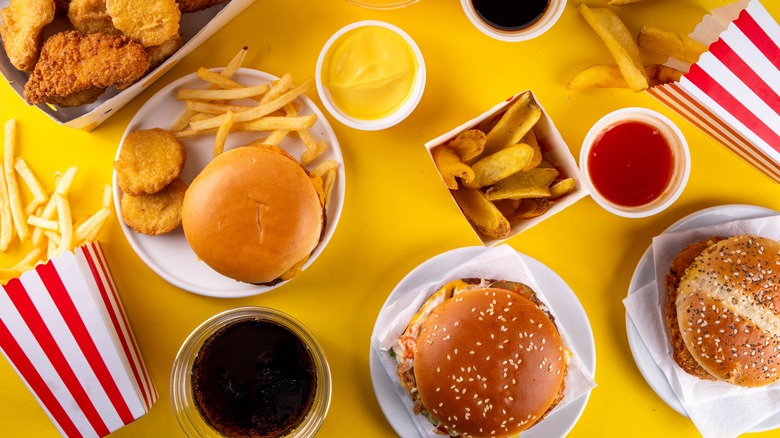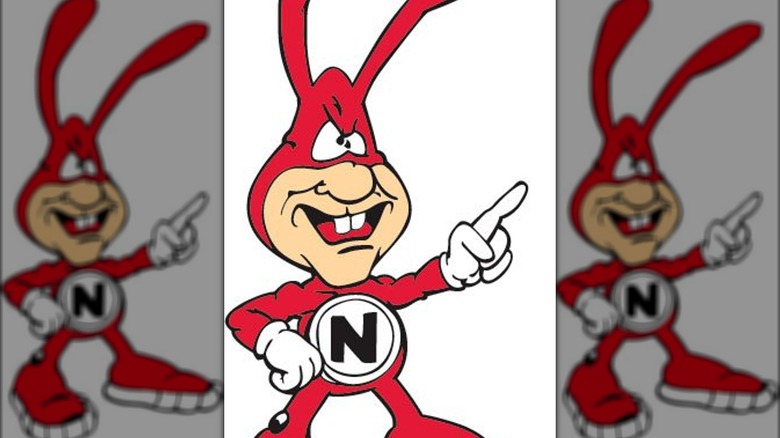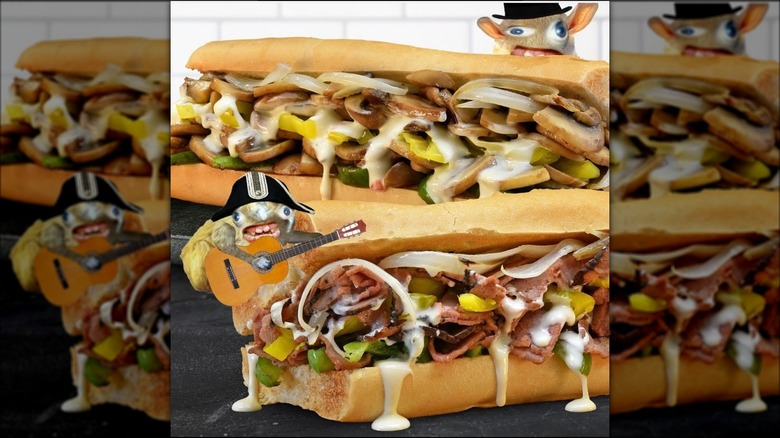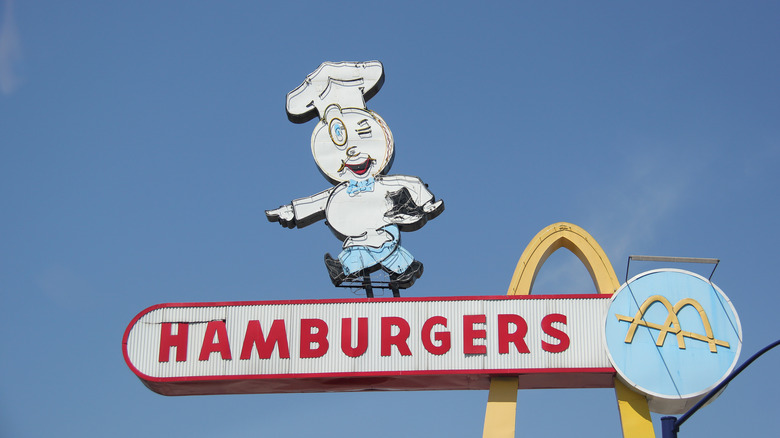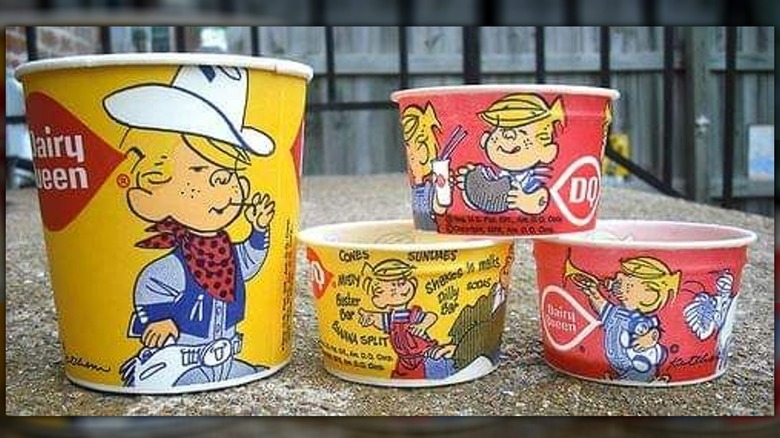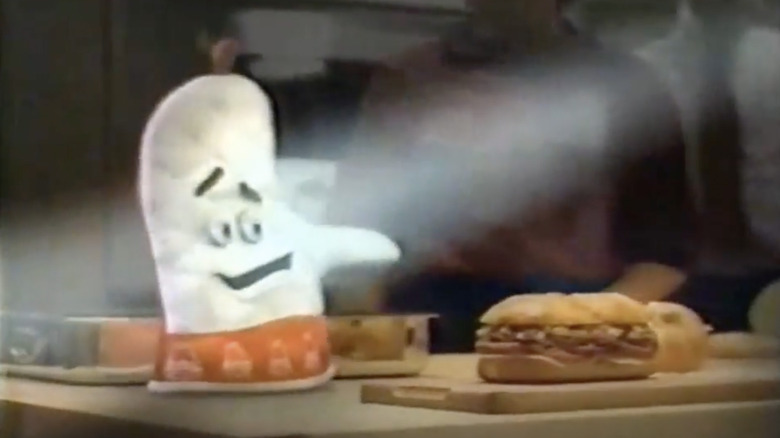5 Fast Food Mascots You've Probably Forgotten
Ever since the mid-20th century, when fast food restaurants were firmly ingrained as a staple of American society, dozens of mascots have made their way in and out of the public zeitgeist. Regardless of whether you enjoy fast food or not, chances are you're likely familiar with at least a few of these exercises in branding, like Ronald McDonald, the Burger King, and Colonel Sanders (who is actually based on a real person!). These colorful characters help fast food chains in a few ways. For one thing, they help to humanize a company by transforming a corporate logo into something that customers find funny, relatable, or endearing. Mascots and their brands become inextricably linked in a consumer's mind, so the more they like a mascot the more money they're likely to spend at that chain.
With food delivery taking over and tricky digital kiosks inhabiting more and more restaurants every day, things have changed a lot since the first mascots popped up. Showbiz is tough, and over the years some mascots have faded from the spotlight. Whether it's due to changing marketing strategies or a shift in consumer preferences, not every mascot has what it takes to cement itself as a household name. However, even these forgotten characters once played a crucial role in the fast-food industry's advertising landscape.
The Noid (Domino's Pizza)
The Noid, introduced in 1986, was an impish, villainous, pizza-hating mascot for Domino's Pizza. Adorned in a red bodysuit with bunny ears, The Noid was an animated character that was a representation of all the things that could go wrong with pizza delivery. As part of its advertising campaign, Domino's made a simple promise: customers could "Avoid the Noid" by ordering from a location and getting a fresh, hot pizza delivered in 30 minutes or less.
Unfortunately, there is some dark history attached to The Noid. In 1989, a man named Kenneth Lamar Noid was convinced the character was based on him, and he held Domino's employees hostage in response. No one was hurt during this initial ordeal, but the negative image it gave The Noid caused Domino's to retire the mascot a few years later in 1995.
The Spongmonkeys (Quiznos)
Absurdist animated comedy may not be the first thing to come to mind when you think of Quiznos, but that's exactly the direction the sandwich shop went with for its 2004 ad campaign. This series of ads featured internet characters called the Spongmonkeys, a couple of fuzzy, mousy things with unsettlingly human eyes and mouths. They loved to sing about sandwiches in a high-pitched voice, and thanks to their unique aesthetic and quirky humor, the Spongmonkeys became about as viral as possible for the early 2000s.
Though the Spongmonkeys attracted plenty of buzz, their strangeness alienated some customers. They were featured on their final TV commercial in 2005, but they did recently make their way back onto the Quiznos payroll in 2023 to announce the expansion of the franchise.
Speedee (McDonald's)
Ronald McDonald may be the clown prince of commercials these days, but he would be nowhere without a little anthropomorphic burger chef named Speedee. With his hamburger head, Speedee became McDonald's original mascot in the early 1950s and was a symbol of the chain's quick service. He was named after the "Speedee Service System," which made the chain the powerhouse it is today by popularizing efficient service and production of consistent, cheap food. Interestingly, although McDonald's is arguably the biggest and most influential fast food chain around today, it's not the first — that honor belongs to White Castle.
As McDonald's grew and sought to reinvent its image, Speedee was phased out in favor of Ronald McDonald, who first appeared in 1963 and quickly became the brand's most enduring mascot. Speedee has since faded from memory, but he will never be forgotten. In fact, you can still find Speedee standing over the signs of some of the first McDonald's locations.
Dennis the Menace (Dairy Queen)
In the 1970s, Dairy Queen took on the iconic comic strip character Dennis the Menace as its brand mascot. Dennis, known for his mischievous and adventurous spirit, was popular with kids and a natural fit for Dairy Queen's family-friendly image. He appeared in a series of advertisements and paperware to promote the chain's signature soft-serve ice cream and treats, often causing a bit of mayhem in the process.
Dennis the Menace remained part of the Dairy Queen brand until 2002. The company reports on its website that this is because the trademark license expired, but it can also be assumed that the new generation of children weren't as familiar with Dennis, giving DQ little reason to keep him around. Still, this little troublemaker remains a nostalgic figure for those who grew up with him on the sides of their Blizzards.
Oven Mitt (Arby's)
In 2003, Arby's introduced a talking oven mitt as its mascot, voiced by comedian Tom Arnold. The character, named Oven Mitt, was designed to highlight Arby's use of real oven-roasted beef, with the mitt itself symbolizing the care and quality that went into preparing the chain's signature sandwiches. With a friendly, slightly bumbling personality, Oven Mitt was intended to charm customers and give Arby's a relatable, home-cooked feel.
Sadly, Oven Mitt didn't catch on quite like Arby's had hoped. Many hated poor Oven Mitt, with customers saying that he was scary and annoying. Needless to say, he was retired after just a couple of years. Though short-lived, the Oven Mitt remains a quirky part of Arby's history that some fans may fondly remember.
Fast food mascots may come and go, but their impact on advertising is undeniable. Whether they were funny, strange, or downright confusing, these characters helped shape the way we experience fast food culture. While some mascots remain timeless, others have been lost to the fast food archives, remembered only by those with a sharp memory for marketing nostalgia.
